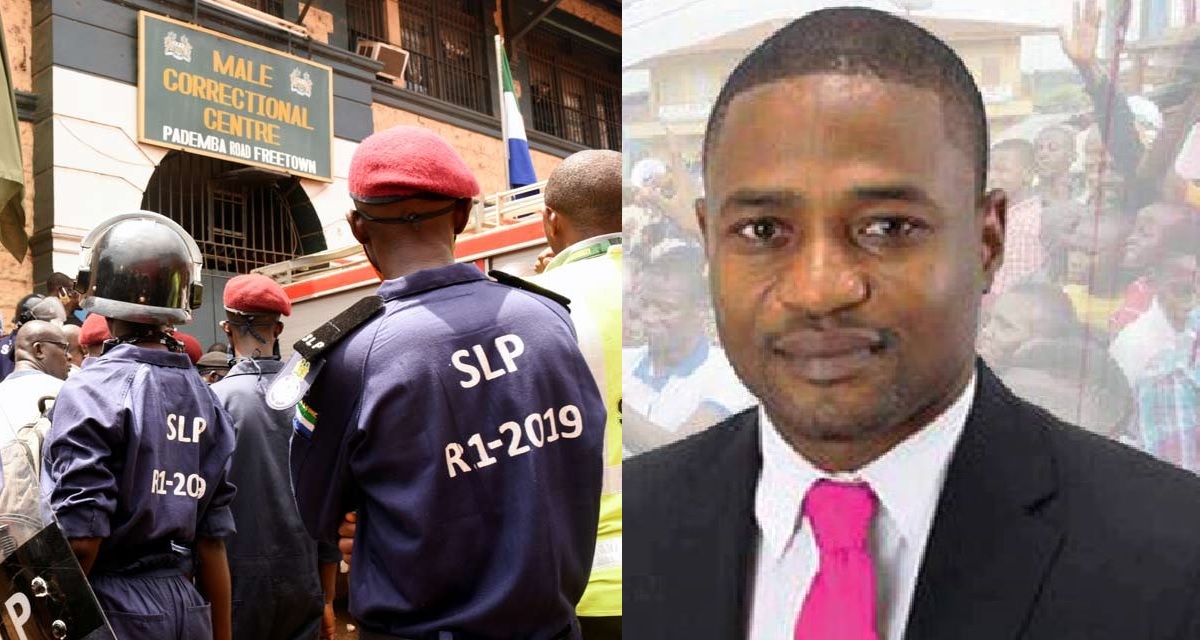Senior Human Rights advocate from the Campaign for Human Rights and Development International (CHRDI), including the Chief Executive , Abdul M. Fatoma, made a formal request to the Ministry of Internal Affairs and Prison officials to visit Mr. Mohamed Kamarainba Mansaray at one of the Sierra Leone Correctional Services facility in Freetown, Sierra Leone.
It would be recalled that on the 17th July 2020, a police complaint for an alleged sexual penetration of a 15 year old school girl, led to his arrest by the Criminal Investigations Department (CID) of the Sierra Leone Police and later detained and charged to court on the 21st July same year (2020). On the 7th September 2021, he was granted bail, but he still remained in a detention facility in Freetown on the grounds that he failed to meet his bail conditions.
The visit has been described by the CHRDI team as very useful because it offered them the opportunity to form correct opinions or make valid conclusions. According to members of the team, they were made to learn during their visit, that Mr. Mohamed Kamarainba Mansaray has serious medical challenges, which need immediate attention.
Mr. Mansaray told CHRDI that he has spent a year and half in detention and has been diagnosed with prostate cancer by two medical Doctors while in detention. He also disclosed that because of his medical condition, he has to use the toilet to urinate every 30-40 mins, failing which, he will urinate on himself and he also revealed that about a year ago, a neurologist from ECO-MED, recommended to the Correctional Services that he should have a surgical operation which he was denied.
In October 2021, according to Mohamed K Mansaray, a very senior authority at the Correctional services center advised him to raise funds for his medical laboratory test fees as the facility is unable to provide him with that fund. By December 2021, Mr. Mansaray was able to raise five million, eight hundred and sixty thousand Leones (5,860,000) by himself and from monies given to him by family and friends but also claimed that the said money was taken away from his detention room by a senior authority who promised to give him back the money but later confiscated it.
At the time of the visit, the team was reliably informed that an internal investigation into an allegation of the possible use of a cell phone in a detention facility and also of inmates being in possession of money above the one hundred thousand Leones limit for all inmates at the facilities across the country.
Asked about his Bail Bond, Mr. Mansaray responded that he had fulfilled his bail condition but yet in prison but informed CHRDI that he has family members and friends who visit him.
In conclusion, Mr. Mohamed Kamarainba Mansaray pointed out that he has not been subjected to any inhumane treatment from neither prison officers nor from any other person or individual but pointed out that whenever he has visitors, there will always be military personnel and prison officers listening to their conversation. The CHRDI team also experienced a similar situation during the visit.
In view of all of the above, CHRDI hereby draws attention to the UN Standard Minimum Rules for the Treatment of Prisoners, which establishes standards on a range of matters. They include accommodation conditions, adequate food, personal hygiene, clothing and bedding standards, exercise, medical services, and disciplinary procedures. These rules are now complemented by the Optional Protocol to the UN Convention against Torture and Other Cruel, Inhuman or Degrading Treatment or Punishment. This obliges States to set up preventive monitoring mechanisms to maintain detention standards.
CHRDI expresses disappointed and denounce the service and conditions of the facilities for both security personnel and the inmates and calls for proper improvement of the detention centers and the conditions of services for all the workers. CHRDI also points out to the fact that there are no in-house psychiatrist Doctor(s) or clinicians in the centres and correctional services personnel have to apply ‘common sense’ to treat inmates with mental health issues or call on the country’s only psychiatric Doctor for treatment. There is no external monitoring or oversight, which is extremely damaging, considering the level of negligence and incompetence displayed by some correctional services personnel on a daily basis.
Keeping inmates in jail in a very poor health conditions puts both their own health and the health of the Correctional Services staff who come into contact with them at risk and impedes efforts to maintain public health. It also defies both Sierra Leonean and international law, which requires care for the health of prisoners. CHRDI urges the government of Sierra Leone to implement the just concluded prisons management assessment recommendations
In these circumstances, the CHRDI further urges the authorities to take action now, before it is too late, and use different tools to reduce the prison population.
NOTE: Campaign for Human Rights and Development International (CHRDI) is a Rights based social-policy advocacy Organisation. We draw attention to the responsibilities of duty-bearers to uphold human rights, and seek to support rights-holders to claim their rights. CHRDI is in Special Consultative Status to the United Nations Economic and Social Council (UN-ECOSOC) and accredited to many UN Agencies.











